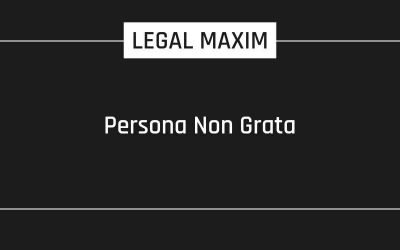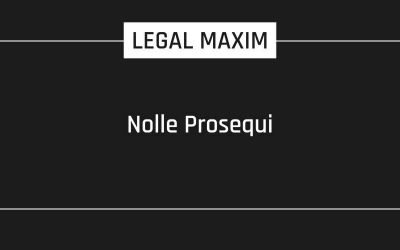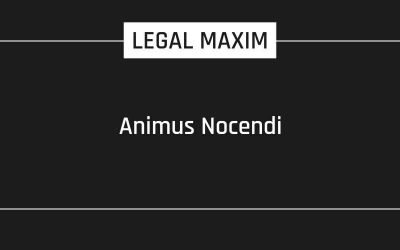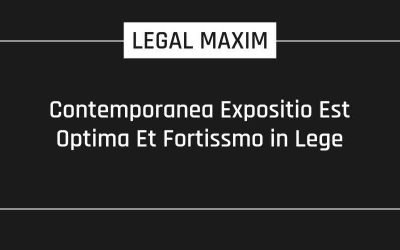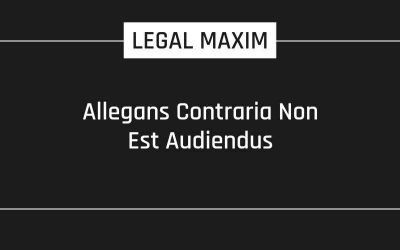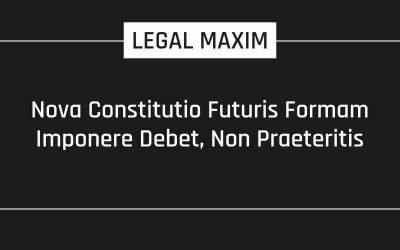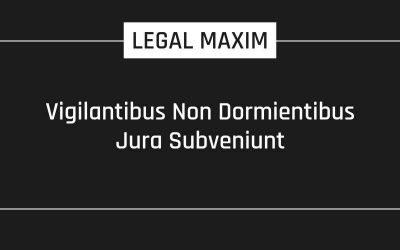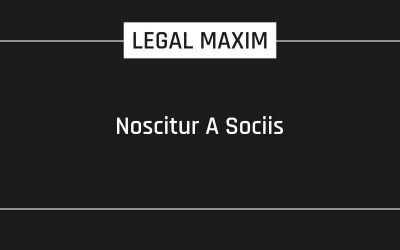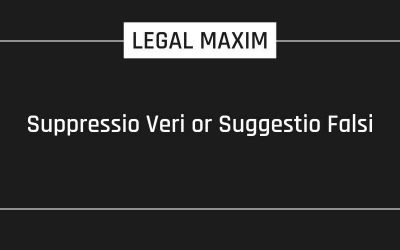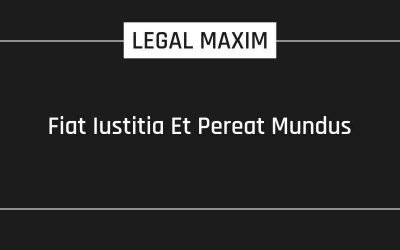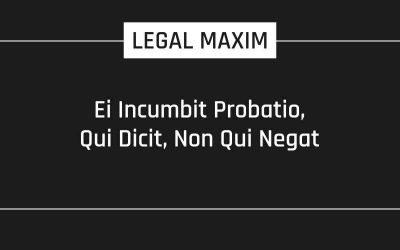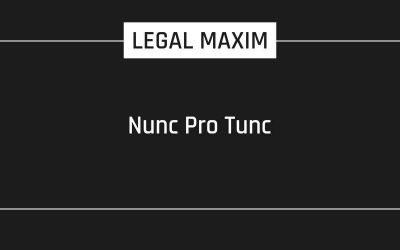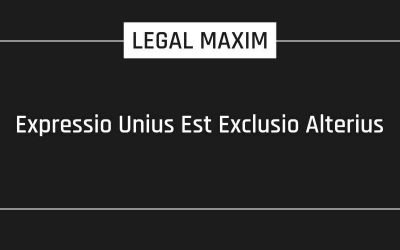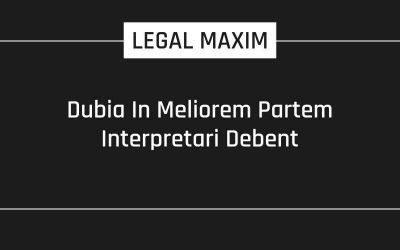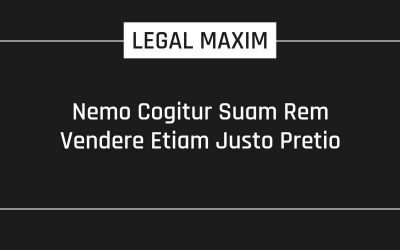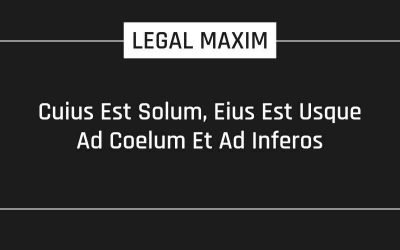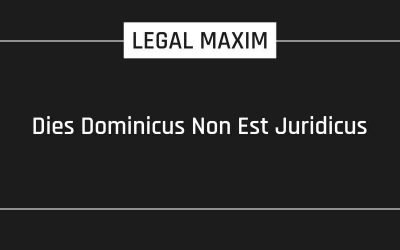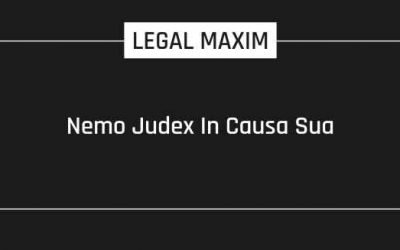Legal Maxims
Cadit Quaestio
Legal Maxim Cadit Quaestio Literal Meaning Question falls/ argument collapses Origin Latin Explanation The above maxim is derived from two Latin words “cadit” means to fall and “quaestio” means question. It means that there is no further argument or discussion which...
Prohibition
Literal Meaning To forbid or to stop. It is popularly known as ‘Stay Order’. Explanation A writ of prohibition is issued primarily by a superior court to prevent an inferior court or tribunal from exceeding its jurisdiction in cases pending before it or acting...
Ab Extra
Literal Meaning From without, from the outside Origin Latin Explanation The knowledge obtained from external sources refers to Ab Extra. This maxim deals with the situation in which, aside from the real source of it the source of something is. Where there is any...
Per Minas
Literal Meaning By means of menaces or threats Origin Latin Explanation When a person is forced to enter into a contract by threats or menaces, it can be called per minas. When a person fears death or any mayhem on not acting according to the threat, the person may...
Persona Non Grata
Literal meaning Person not welcome Origin Latin Explanation This maxim has evolved in the field of diplomatic relations and such a declaration means that the foreign diplomat is unwelcome in that country; he is not permitted to enter or continue to stay in a...
Nolle Prosequi
Literal meaning Unwilling to pursue Origin Latin Explanation This maxim means that there is no longer a will to pursue the case forward. It is generally applied by a judge or the prosecutor with respect to a criminal case. In some instances, it is also used by a...
Animus Nocendi
Literal meaning Mind to Harm Origin Latin Explanation In criminal jurisprudence, the maxim animus nocendi is indicative of a state of mind of the criminal offender. It denotes that the offender has the actual and exact knowledge of the criminal act that is being...
Contemporanea Expositio Est Optima Et Fortissmo in Lege
Literal Meaning The best way to construe a document is to read it as it would be read when it was made. Origin Latin Explanation This maxim is based on the principle of Salmond- “the essence of law lies in the spirit, not its letter or the latter is significant only...
Allegans Contraria Non-Est Audiendus
Literal Meaning A person making contradictory allegations are not to be heard Origin Latin Explanation The legal maxim ‘Allegans Contraria Non-Est Audiendus’ means that a person adducing to the contrary is not to be heard. This is the principle of good faith that a...
Nova Constitutio Futuris Formam Imponere Debet, Non Praeteritis
Literal Meaning A new law ought to regulate what is to follow, not the past. Origin Latin Explanation To understand the meaning of the above legal maxim, it can be said that a new state of the law is supposed to affect the future, not the past. It means that the...
Pari Materia
Literal Meaning Of the same matter; on the same subject Origin Latin Explanation The doctrine of Pari Materia is a useful tool for the interpretation of statutes that work towards the same objective. It is an ordinary rule of interpretation of statutes that the words...
Vigilantibus Non Dormientibus Jura Subveniunt
Literal Meaning The law assists only those who are vigilant, and not those who sleep over their rights. Origin Latin Explanation The maxim refers to the obligation of individuals to not only be aware of their rights under the law, but also to be vigilant while...
Noscitur A Sociis
Literal Meaning The meaning of a word may be known from accompanying words Origin Latin Explanation The above principle is a rule of construction and is one of the rules of interpretation that is used by the courts to interpret the legislation. The translation of...
Suppressio Veri or Suggestio Falsi
Literal Meaning Suppression of truth or Suggestion of an untruth Origin Latin Explanation This maxim has emerged as a rule of equity, as well as a rule of law. It means that when with respect to a material fact of the case, either suppression of truth or suggestion of...
Fiat Iustitia Et Pereat Mundus
Literal meaning Let justice be done, though the world shall perish Origin Latin Explanation It is very aptly said, injustice anywhere is a threat to justice everywhere. This sentence was the motto of Ferdinand I, Holy Roman Emperor. The maxim aptly summarises the...
Ei Incumbit Probatio, Qui Dicit, Non Qui Negat
Literal Meaning The burden of proof lies upon the person who affirms but not who denies. Origin Latin Explanation The principle as stated means that the onus to prove the guilt of the accused lies upon the person who affirms it i.e. it is the prosecution’s duty to...
Nunc Pro Tunc
Literal Meaning Now for Then Origin Latin Explanation According to this maxim, a court or party to a divorce forgets to file the papers necessary to obtain the final decree (after the interlocutory judgment has been granted), and the result is that the divorce never...
Expressio Unius Est Exclusio Alterius
Literal meaning The explicit mention of one (thing) is the exclusion of another Origin Latin Explanation The legal maxim simply means that if one of the two possibilities of an event is talked about expressly, then the second possibility is kicked out by default....
Dubia In Meliorem Partem Interpretari Debent
Literal meaning Doubtful things should be interpreted in the best way Origin Latin Explanation This maxim is often abbreviated as “to give the benefit of the doubt”. It simply means that, if there is no prima facie or circumstantial evidence to prove a certain act,...
Nemo Cogitur Suam Rem Vendere Etiam Justo Pretio
Literal meaning No one is bound to sell his own property, even for a just price. Origin Latin Explanation This legal maxim lays emphasis on the simple fact that no one can be forced or bound to sell his property, without his free consent to do so. It is a...
Dramatis Personae
LITERAL MEANING Persons of the Play ORIGIN Latin EXPLANATION This Latin maxim is used to refer collectively to the characters represented in a dramatic work. This phrase is the conventional heading for a list of characters that are published in the play or theatrical...
Cuius Est Solum, Eius Est Usque Ad Coelum Et Ad Inferos
Literal meaning Whoever's is the soil, it is theirs all the way to Heaven and all the way to Hell Abbreviated form ad coelum Origin Latin Explanation The maxim is based on the principle that governs the English property laws and solves the question regarding the...
Dies Dominicus Non Est Juridicus
Literal Meaning Sunday is not a day for judicial or legal proceedings Origin This Latin maxim has, at its origin, the 4th of the Ten Commandments, to keep Sunday ‘holy’; later, Sunday was said to be the day of the week upon which Jesus resurrected. Explanation It...
Nemo Judex In Causa Sua
Literal meaning No one is a judge in his own case Origin Latin Explanation The underlying principle of the maxim says that, no one can judge his own case. It is said so because it contradicts the principles of natural justice. The principles of natural justice include...




